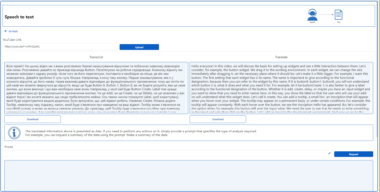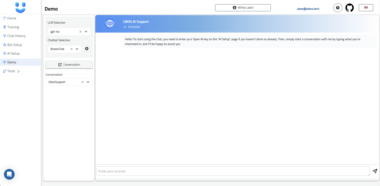Simple Loki MCP Server: Unleash the Power of AI on Your Logs with UBOS
In the burgeoning landscape of AI-driven automation and intelligent systems, the ability to contextualize and analyze data becomes paramount. The Simple Loki MCP Server emerges as a pivotal tool, bridging the gap between AI assistants and the wealth of information locked within your Grafana Loki logs. This Model Context Protocol (MCP) server allows AI models to directly access and interpret log data using LogQL, paving the way for a new era of proactive monitoring, intelligent troubleshooting, and insightful analysis.
What is MCP and Why It Matters?
Before diving into the specifics of the Simple Loki MCP Server, it’s crucial to understand the fundamental role of MCP. The Model Context Protocol (MCP) is an open standard designed to streamline how applications provide contextual information to Large Language Models (LLMs). Think of it as a universal translator, enabling AI agents to understand and interact with diverse data sources and tools. Without MCP, integrating AI into complex systems becomes a cumbersome and often unreliable process.
MCP servers, like the Simple Loki MCP Server, act as intermediaries, handling the intricacies of data access and formatting. They present a consistent and easily digestible interface to AI models, allowing them to focus on what they do best: analyzing, reasoning, and generating intelligent responses.
Simple Loki MCP Server: A Deep Dive
The Simple Loki MCP Server is specifically designed to connect AI agents to Grafana Loki, a popular open-source log aggregation system. By implementing the MCP protocol, this server allows AI assistants to query and analyze Loki logs using LogQL, the powerful query language of Loki.
Key Features:
- LogQL Support: The server provides full support for LogQL, enabling AI agents to perform complex log queries with filtering and aggregation.
- Label Value and Metadata Retrieval: It allows AI models to fetch label values and metadata associated with logs, providing valuable context for analysis.
- Flexible Configuration: The server supports configuration through environment variables and config files, allowing seamless integration into existing infrastructure.
- Multiple Output Formats: Results can be formatted in different output formats (default, raw, JSON lines) to suit various AI model requirements.
- Automatic HTTP API Fallback: If the
logclitool is not available, the server automatically falls back to the Loki HTTP API, ensuring functionality even in environments withoutlogcli.
Use Cases: Transforming Log Data into Actionable Insights
The Simple Loki MCP Server unlocks a wide range of use cases for AI-powered log analysis:
- Automated Incident Detection and Response: AI agents can monitor logs for anomalies, automatically detect incidents, and trigger appropriate responses. Imagine an AI assistant proactively identifying a spike in error logs and alerting the on-call engineer, all before the issue impacts users.
- Intelligent Troubleshooting: By analyzing logs, AI agents can pinpoint the root cause of problems, reducing troubleshooting time and improving system uptime. No more endless scrolling through logs – let AI highlight the critical information.
- Proactive Performance Monitoring: AI models can track key performance indicators (KPIs) in logs and identify potential bottlenecks before they become critical issues. This allows for proactive optimization and ensures smooth application performance.
- Security Threat Detection: The server enables AI agents to analyze logs for suspicious activity, identifying potential security threats and triggering security alerts. Detect intrusion attempts and malicious behavior in real-time.
- Compliance Auditing: AI assistants can automatically analyze logs for compliance violations, ensuring adherence to industry regulations and internal policies. Simplify the auditing process and maintain regulatory compliance.
- Enhanced Observability: By providing AI agents with access to log data, the Simple Loki MCP Server enhances observability, giving you a deeper understanding of your systems’ behavior.
Integrating with the UBOS Platform: A Powerful Synergy
The Simple Loki MCP Server becomes even more powerful when integrated with the UBOS platform. UBOS is a full-stack AI Agent development platform designed to empower businesses to orchestrate AI Agents, connect them with enterprise data, build custom AI Agents with LLM models, and create sophisticated Multi-Agent Systems.
Here’s how the synergy between the Simple Loki MCP Server and UBOS unlocks new possibilities:
- Seamless Integration: UBOS provides a unified environment for deploying and managing the Simple Loki MCP Server, simplifying the integration process.
- Centralized Orchestration: UBOS allows you to orchestrate AI agents that leverage the Simple Loki MCP Server alongside other data sources and tools, creating comprehensive AI-powered workflows.
- Customizable AI Agents: With UBOS, you can build custom AI agents tailored to your specific log analysis needs, leveraging the Simple Loki MCP Server for data access.
- Multi-Agent System Capabilities: UBOS enables you to create Multi-Agent Systems where different AI agents collaborate to analyze logs and respond to incidents, providing a more robust and intelligent solution.
Technical Deep Dive: How It Works
The Simple Loki MCP Server acts as a conduit between AI agents and Grafana Loki, handling the communication and data transformation required for seamless integration. Here’s a breakdown of the technical aspects:
- AI Agent Request: An AI agent sends a request to the Simple Loki MCP Server, specifying the LogQL query and any relevant parameters.
- Query Execution: The server executes the LogQL query against the Grafana Loki instance, either through the
logclitool or the Loki HTTP API. - Data Transformation: The server transforms the raw log data into a format suitable for consumption by the AI agent, such as JSON or a human-readable string.
- Response Delivery: The server sends the transformed log data back to the AI agent.
Installation and Configuration
The Simple Loki MCP Server can be installed and configured in several ways, offering flexibility to suit different environments:
- Using Smithery: The easiest way to install the server is via Smithery, an AI agent marketplace. This automates the installation process and integrates seamlessly with Claude Desktop.
- Manual Installation: The server can also be installed manually using
npm. This involves cloning the repository, installing dependencies, and building the project.
Configuration is primarily done through environment variables or config files. This allows you to specify the Loki server address, authentication credentials, and other settings.
Conclusion: Empowering AI with Log Data
The Simple Loki MCP Server is a critical component for any organization looking to leverage the power of AI for log analysis. By providing a standardized and efficient way for AI agents to access and interpret log data, this server unlocks a wide range of use cases, from automated incident detection to proactive performance monitoring.
When combined with the UBOS platform, the Simple Loki MCP Server becomes an even more potent tool, enabling you to build sophisticated AI-powered workflows that transform log data into actionable insights. Embrace the future of log analysis with the Simple Loki MCP Server and UBOS, and unlock the true potential of your data.
Loki MCP Server
Project Details
- ghrud92/loki-mcp
- MIT License
- Last Updated: 5/9/2025
Recomended MCP Servers

A real-time cryptocurrency data provider for Model Context Protocol servers.

MCP Server example with TypeScript
Model Context Protocol Server for NebulaGraph 3.x
A MCP server for automated website deployment to 1Panel (Experimental)
The Logfire MCP Server is here! :tada:
Uses DALL-E to generate/edit images, an MCP (Model Context Protocol) server
The Daisys mcp server


Chat with your portfolio.
 From vibe coding to vibe deployment. UBOS MCP turns ideas into infra with one message.
From vibe coding to vibe deployment. UBOS MCP turns ideas into infra with one message.






